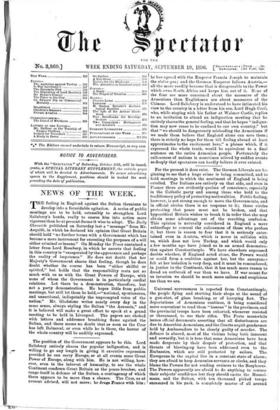The position of the Government appears to be this. Lord
Salisbury entirely shares the popular indignation, and is willing to go any length in giving it executive expression provided he can carry Europe, or at all events some Great Power of Europe, along with him. He is not willing, how- ever, even in the interest of humanity, to see the whole Continent condemn Great Britain as the peace-breaker, and range itself in defence of the Sultan, a contingency of which there appears to be more than a chance. The Czar, as at present advised, will not move; he drags France with him:
he has agreed with the Emperor Francis Joseph to maintain the status quo; and the German Emperor follows Austria,— all the more readily because that is disagreeable to the Power which owns South Africa and keeps him out of it. None of the four are more concerned about the massacre of the Armenians than Englishmen are about massacres of the Chinese. Lord Salisbury is understood to have intimated his view to the country in a letter from his son, Lord Hugh Cecil, who, while staying with his father at Walmer Castle, replies to an invitation to attend an indignation meeting that he entirely shares the general feeling, and that he hopes " indigna- tion may now cease to be confined to our own country," but that " we should be dangerously misleading the Armenians if we made them believe that England alone can save them ; there is strictly no hope for them till feeling abroad at least approximates to the excitement here," a phrase which, if it expressed the whole truth, would be equivalent to a final sentence on the entire Armenian people. Fortunately the callousness of nations is sometimes stirred by sudden events so deeply that spectators can hardly believe it ever existed.


































